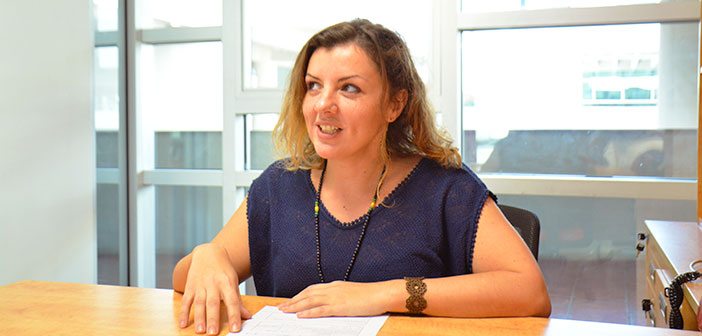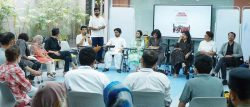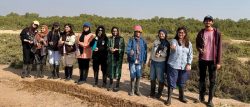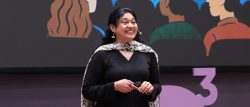Many of us have read detective and spy stories during their childhood. I found those to be very intriguing. There was always some mystery to solve. Such stories and my early passion in mathematics inspired my interest later on in the science of cryptography. In cryptography you have to solve mathematical puzzles and deciphering them gives me a great sense of accomplishment and satisfaction.
Hailing from Leuven, Belgium, Dr. Elena Andreeva visited Habib University to introduce the realm of Cryptography to the HU students and community. Through instructive classes and interactive workshops, the students were familiarized with the art of keeping secrets through coding and decoding processes. While on the other hand, we decided to crack the code and delved into the life and work of our cryptic virtuoso, so as to find out more about her and to learn about her inspiration and experiences of how it feels to live and teach in Pakistan.
Please enlighten us about your academic/professional journey and interests.
EA: I am a postdoctoral researcher at the COSIC Research Group at KU Leuven, Belgium. I completed my Ph.D. thesis on the topic, “Domain Extenders for Cryptographic Hash Functions” under the supervision of Prof. Bart Preneel. My main research interests in the field of cryptography include Provable Security, Hash Functions, Block Ciphers, and Authenticated Encryption Schemes.
What fascinated you towards Cryptography?
EA:There have been many factors behind this choice. One of my early recollections are the detective and spy stories I used to read during childhood. I remember that I always used to find them intriguing and I took delight in solving the mysteries. I also took deep interest in mathematics early on. Cryptography goes in the same direction. You have to solve some mathematical puzzles and it requires a lot of logical thinking. Studying cryptography means also that you have to look at problems from a different perspective and you try look for non-obvious weaknesses in a system, then devise ways to combat security problems, etc. It is always open to new challenges and new directions and I like the challenge.
So have you always enjoyed solving puzzles since your childhood?
EA: Always is a big word, I would say…but I have found it interesting most of the time. It gives you a sense of satisfaction and accomplishment once you are done cracking a puzzle.
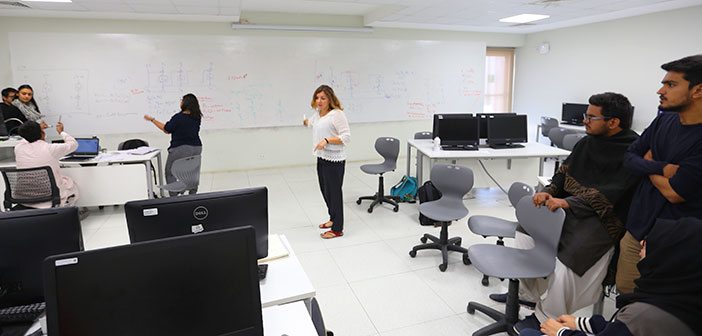
How has your experience of teaching been at Habib University?
EA: I am glad that I had an opportunity to teach here since I liked the environment at the campus very much. The campus of Habib university is quite self-contained in a way: at the campus you have access to almost everything for both education, sports and some more leisurely activities and the facilities are available for everyone. The community is friendly and cooperative and you can easily interact with each other. I also found students to be very inquisitive for knowledge and very motivated to be here. Students seemed to know why they are here and most of them do understand what they are doing and want to do. I also learnt new things from them. I can see a strive for knowledge here and I hope the students succeed in achieving their goals, keep themselves content in their lives, and are always aware of their impact in the world. With respect to Cryptography, when I had graduated, my professor told us that our Dr. title is not only an honor but also an obligation towards society. Gaining and striving for knowledge is not only about pushing boundaries but it is also a responsibility in terms of how you are going to do this, and how this is going to influence society. It is very important to carry some kind of moral duty and obligation particularly in our field of research where information can be highly misused and abused.
Talking about living and teaching in Pakistan, are there any interesting memories you would like to share with us?
EA: I found Pakistani people to be very welcoming and accommodating. It has been an amazing experience for me. I admit I had to be more careful in my movements outside of campus but it all has been a very enriching and joyful experience overall.
What is it that you like to do in your free time?
EA: I like to paint, swim, and go scuba diving.
Are these paintings cryptic as well?
EA: [chuckles] Not really. For me they are not, but they might be for others. As far as I am concerned, they are a source of self-expression for me.
How do you feel about the research facilities being offered in our country as compared to the ones provided at Belgian universities?
EA: I think the University has ample facilities and I do not see any major thing lacking.
What advice would you give to the students interested in pursuing a career in Cryptography?
EA: I would tell them to not be afraid of the challenges that they might encounter during the initial months of their research. It is not going to be easy but it is going to be rewarding and they should never get discouraged easily. They should simply go for it and be curious at all times. Also, thinking out-of-the-box is one of the main qualities of a good researcher. So, do not be afraid to think the unthinkable! The way to make a difference will require to open doors to new concepts and ideas and not necessarily stick to the conventional wisdom.

